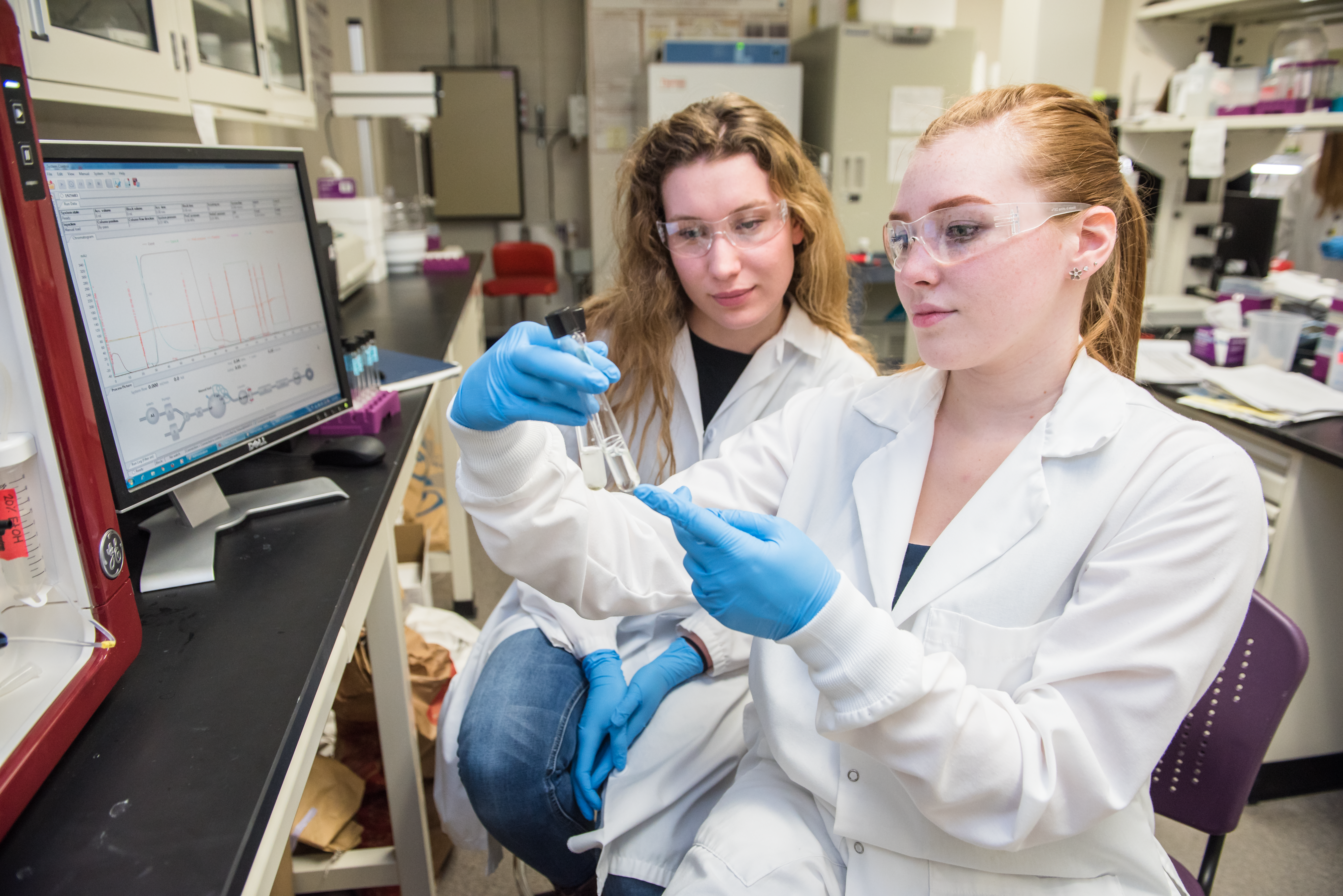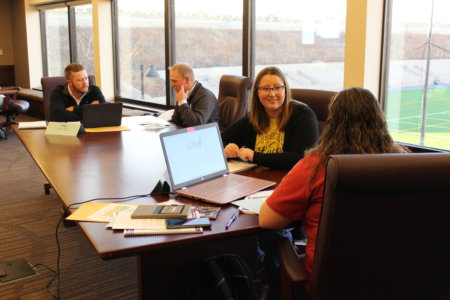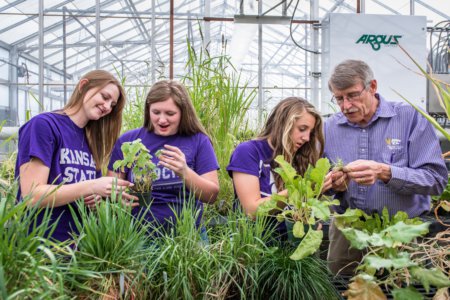Dr. Lisa Wilken earned her bachelor’s degree in biological and agricultural engineering at Kansas State University (K-State) with a focus on biological engineering. She credits her bachelor’s degree for giving her a launchpad to a career in the field of biomanufacturing, the production of valuable products using living cells. “I had the opportunity to do undergraduate research in bioprocessing in the very laboratory that will become our new Biomanufacturing Laboratory. This research experience sparked my interest in bioprocess engineering and led me to Texas A&M University to pursue a PhD in Biological and Agricultural Engineering,” she says.
Dr. Wilken returned to K-State as a faculty member in the Carl and Melinda Helwig Department of Biological and Agricultural Engineering (BAE). She now leads BAE’s efforts to train new professionals in biomanufacturing, which is used to make new pharmaceuticals, vaccines, renewable energy, and renewable plastics among other impactful products that improve health and reduce carbon emissions.
Likewise, Dr. Abby E. is also a K-State graduate who came to the US after studying food technology at China Agricultural University and earning her master’s degree in grain science at K-State. She would later complete a doctorate in biosystems and agricultural engineering from the University of Kentucky, publish several peer-reviewed journals and become a director of agriculture technology at PureLine for seven years.
“I was approached by the BAE Department within the Carl R. Ice College of Engineering two years ago about leading the effort to develop courses and curriculum in biomanufacturing,” Dr. E says. “I am very excited to join K-State and be a part of this new program.”
Such is the passion and caliber of the faculty members leading K-State’s BS Biological Systems Engineering (BSE) — Biological Engineering Option and the new BS Agricultural Technology Management (ATM) — Biomanufacturing Technology Option. The goal is to provide a robust pipeline of talent to the expanding biomanufacturing industry in Kansas and beyond by providing students with practical training and skills.
“Kansas is not a traditional biotechnology region; however, a transition from farming to manufacturing is beneficial for the state and the communities,” says Dr. E. “K-State saw this opportunity and invested in this education program in the early stage, so there will be a sufficient labor force to support this industry migration in the near future.”

The all-new Biomanufacturing Laboratory Facility opening in January 2025 is one of the draws of this program. Source: Kansas State University
The BAE department’s engineering and technology management programs are uniquely positioned to provide critical training, educational programs, and skilled graduates to meet the biomanufacturing industry’s needs. The BSE – Biological Engineering program has a strong history of providing industry-ready engineers for the biomanufacturing industry. The new ATM — Biomanufacturing Technology program will prepare students for a variety of career opportunities in the industry, including process technician, analytical technician, quality manager, and regulatory affairs specialist.
An all-new Biomanufacturing Laboratory Facility to support K-State’s Biomanufacturing Training and Education Initiative is under construction with an opening in January 2025. It is one of the draws of K-State. The state-of-the-art facility will be a hub for hands-on training, small-scale production, and research in process improvement and optimization in biomanufacturing. There will be a buffer preparation lab, a cell culture room, team workstations, multiple bioreactors for cell cultures, various unit operations used for separations and purification, and complementary analytical equipment.
Biomanufacturing Technology is a multidisciplinary field. Students have opportunities to study not only the technology itself but also regulatory affairs and ethics in biomanufacturing. “One unique aspect is the inclusion of business and management skills along with a strong technical background needed to become a leader in biomanufacturing,” says associate professor Dr. Lisa Wilken, who is leading the BAE department’s biomanufacturing efforts. “Our programs integrate and apply knowledge of life sciences, biomaterials, agriculture, business, and technology to manage processing systems used for manufacturing human and animal health products such as pharmaceuticals and vaccines.”
Both the ATM — Biomanufacturing Technology and BSE – Biological Engineering programs have an experiential emphasis. Students gain practical know-how in several areas including biomanufacturing operations to manage processing systems used for manufacturing human and animal health products.
“Students will gain hands-on laboratory experience with industry-relevant and scalable equipment used in the industry,” says Dr. Wilken. “Students will be able to extend the classroom to the laboratory and gain hands-on training in aseptic techniques, biosafety and controlled environments, process documentation, bioreactor design and operation, cell growth and kinetics, separation techniques and applications, and industrial bioanalytical methods.”

Kansas State University will introduce ATM – Biomanufacturing Technology in Fall 2024. Source: Kansas State University
K-State has close ties with biotechnology companies in the state, students benefit from these invaluable connections with industry stakeholders and partnering businesses — easing the applications for internships, projects and even employment.
“We continue to engage with industry through on-campus or on-site meetings to discuss workforce needs and how K-State can best prepare our students for the workforce,” says Dr. Wilken. “Furthermore, we have used experts from the K-State Global Campus Market Intelligence and Analysis team to understand program demand, projected occupational growth, and how best to position our current and planned programs to ensure alignment.”
Whether in academia or in industry, K-State graduates are set to become the next generation of biomanufacturing experts ready to make a difference.
Follow Kansas State University Biological and Agricultural Engineering on Facebook and Instagram.












